Racing Towards Reality: The Acting Of Jim Carrey In THE TRUMAN SHOW
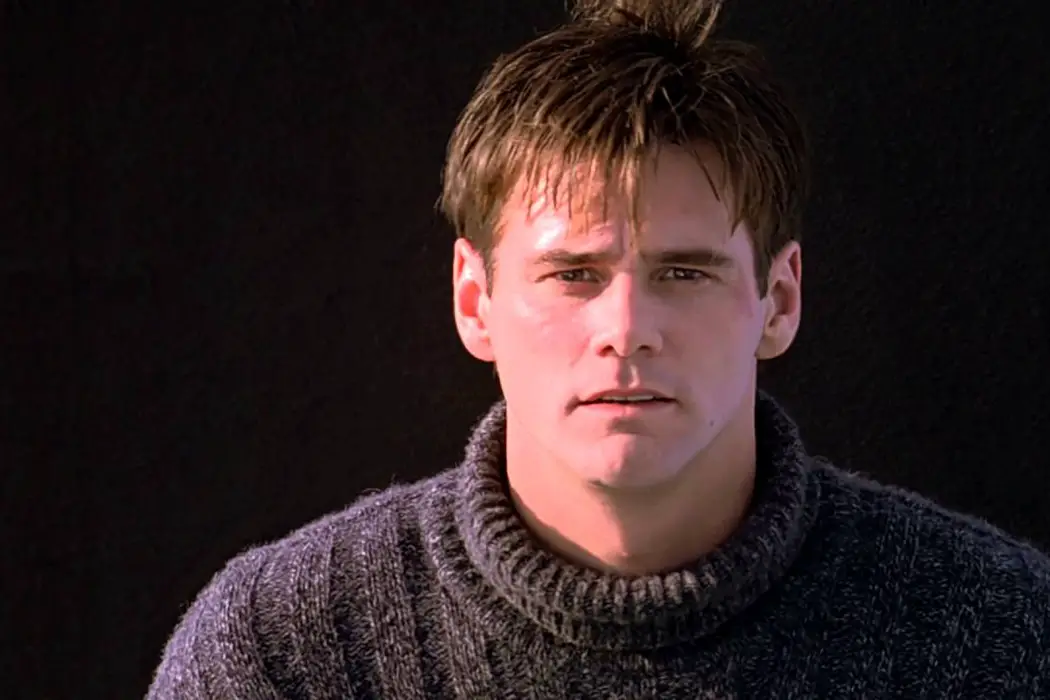
Jack is a recent MA Graduate from the film department…
It is fascinating that, during the casting process of The Truman Show, director Peter Weir decided to cast famous, exuberant, silly actor Jim Carrey on the basis that he reminded him of the great Charlie Chaplin. Of course, some of the comparisons are obvious – slapstick comedy was what propelled both actors to fame, the way they used their bodies as their prop, how their limbs and faces moulded and twisted to become the funniest versions they could possibly be.
Yet what Weir saw in Carrey could perhaps have been linked to a more curious aspect of Chaplin’s career – his later blossoming into an actor who used his comedic skills for dramatic roles. Perhaps The Truman Show is Carrey’s equivalent of City Lights, or Modern Times, or The Great Dictator. Carrey had previously tried to crack into a dramatic style of acting with the unfavourably received The Cable Guy, but Weir saw something in him, a manic sadness perhaps, that led him to actually waiting a full year for Carrey to commit himself to the project.
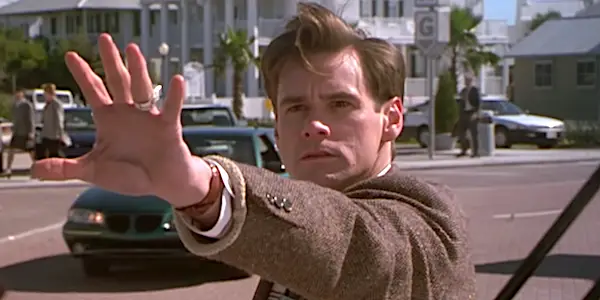
Carrey plays a character, Truman, who is surrounded by fakery: his wife is an actress, his best friend is an actor, every casual passerby is a hired extra and cameras lurk in every corner, watching his every move for worldwide entertainment. It is unclear what year the film actually takes place in (the occasional shots of the audiences watching Truman don’t give too many clues) but Truman himself lives in a romanticised 1950s landscape, a world of brightly decorated interiors, a world straight out of a catalogue where, as the master-planner Christof (Ed Harris) notes, “everything is for sale”.
A Unique Performance in a Unique Role
There is a duality to Truman and to Carrey’s performance – he has developed a reactionary exaggeration to the world around him, its superficiality, constant sunshine and manic smiles bringing it out of him. His now famous morning routine, greeting the neighbours by saying “Good morning! And in case I don’t see ya, good afternoon, good evening and good night!” is almost painfully exaggerated, but it is literally a symptom of the way in which Truman has been bought up. He’s been raised in a catalogue of happiness, a specific kind of normal happiness that has been designed to give him great satisfaction with his life while also ensuring that he is prevented from doing anything groundbreaking or even interesting at all. This is a performance of a blindsided performer; an actor who doesn’t realise that he’s playing the lead role.
Audiences are so used to Carrey playing the oddball, the eccentric living in the real world. What is so great about this role for Carrey is that, while he is prone to bursts of eccentricity, they are only brought out through a reactionary echo to the people and the world around him. A small example of this is Truman’s encounters with the older twins who regularly talk to him before work, with them making sure to push him in front of the same billboard each time to fulfill the show’s sponsors quota. Their attitude is always extremely enthusiastic and Truman responds in the same way, becoming his most charming, arguably most unwittingly entertaining self.
A bigger example of this is, of course, Truman’s interaction with his own wife, Meryl, played by the brilliant Laura Linney. Her performance is one of controlled exaggeration – if Carrey is playing Truman as an unwitting and unwilling actor, Linney is playing Meryl quite simply as a bad actress, or in kinder words, a panicked one at least. Meryl is naturally the character in Truman’s life most susceptible to suspicion: while his mother is cold and plain and his best friend is normal and supposedly supportive, Meryl is a walking exaggeration, continually assaulting Truman with chirpy, scripted advertisements for kitchen utensils or coffee beans.
In a world that is conditioned for Truman to feel safe and normal, Meryl is almost a walking contradiction to that, a blemish in an otherwise controlled reality. While Truman responds to the twins, or any other slightly exaggerated character with the same kind of enthusiasm, he has clearly become tired of Meryl – while obvious problems happen in the world that raise Truman’s levels of suspicion, perhaps it is the obvious artificiality of Meryl that begins his questioning, subconsciously alerting him to the falseness at the centre of his own human experience.
Truman and Meryl are playing different parts, reading from different scripts, and this explosively culminates in one of the film’s most important scenes, their confrontation in the kitchen. Truman is exhausted after another day of confusion, a day in which he has opened up his mind to the possibility of the world being centred around him, to the possibility of the world being inherently fake, and the implications have rendered him shell-shocked. Meryl finds herself in a position where she, as his wife, fictional or not, is tasked with pulling Truman back from the brink and it simply isn’t in her skill-set to do so. So, in a panic, she reverts to type.
A Comedic Edge That Suddenly Frightens
Meryl’s response to Truman’s suffering, Truman’s newfound crisis, is as follows –
“Why don’t you let me fix you some of this new Mococo drink? All natural coco-beans from the upper slopes of Mount Nicaragua, no artificial sweeteners!”
“I’ve tasted other Coco’s [taps container], this is the best!”
There is an expert balance here between absurdity and pure horror – some may find her panicked advertisement in a moment of crisis funny, just for its simple absurdity, for its unnaturalness in comparison to the real world. However, I think most audience members find this short advertisement totally frightening, such is the way that Linney, with her wide, panicked smile and her bulging eyes, swivels and delivers the commercial towards Truman. Yet that is the giveaway, leading to a revolutionary moment for Truman: she is not delivering this commercial to him at all, she’s looking straight through him, directly to the cameras. If there is anybody in the world at that point that is not the intended target audience for the advertisement, it is the person Meryl is addressing – her own husband.
This is a lifting of the veil, an eye-opening moment for Truman as he finally understands that his wife has been talking towards somebody else, to everybody else but him, this entire time. Carrey’s incredulous “What the hell are you talking about? Who you talking to?” is not only a brilliant line -reading but another reminder of Carrey’s newfound physical dramatic presence, with his exaggerated look around the room to find nobody else in it being a physical flourish that would be at home in a comedy, yet here it only heightens the tension, an added layer of incredulously becoming another step closer to the truth.
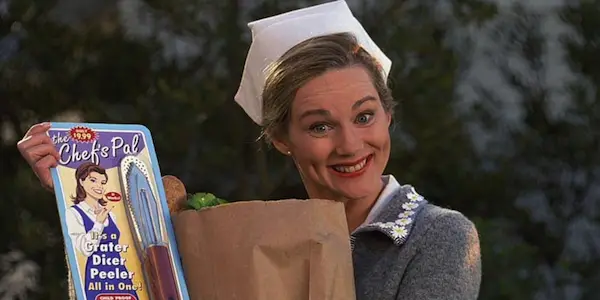
Indeed, the scene that preceded this one is where Carrey uses all of his previous comedic experience, all of his natural energy, his Chaplin-esque possession of his own body and voice, but in a way that frightens, rather than entertains. Truman takes Meryl on an impromptu car-ride, saying that they are going to first drive to Fiji, then Atlantic City and finally New Orleans, testing the limits of this reality that he is beginning to understand is a fabrication. He is suddenly noticing the irregularities of the world – how the traffic diverts itself to stop Truman from getting too far, how it disappears completely seconds later once Truman has ‘changed his mind’, how complete strangers know his name. His energy in this scene is classic Jim Carrey, with his spontaneous actions being matched by his suddenly wild, on-the brink persona. Carrey is hamming it up, reverting to type, but it is within the tone of a film that means for us to be worried for his character, worried for how fast he is unravelling and what truths he might find behind the veil of his reality. This scene, juxtaposed with the subsequent one in the kitchen, truly helps give this film its power.
For when Truman incredulity says “What the hell are you talking about? Who you talking to?” to Meryl after her coco-beans commercial, it is not said with the mania of the previous scene, not with the same wild edge or insanity. Carrey sounds exhausted when he says it, exhausted of his wife clearly not loving him, of the world changing around his every move, of the feeling of being talked through rather than talked to. This line-reading is just as frightening as the madness of the previous scene due to how tired it is in comparison, how worn-down Carrey sounds. For Truman this is the beginning of understanding, and for Carrey, this is a wonderful demonstration of the duality in performance that he is capable of.
Laying the Foundations for Eternal Sunshine of the Spotless Mind
Carrey would eventually be snubbed by the Academy for this extraordinarily performance, but the Golden Globe was rightfully given to him, a marked signal of intent by the actor that perhaps this would not be a simple blip in his career away from comedy. Six years after The Truman Show in 1998, Carrey starred alongside Kate Winslet in Charlie Kaufman and Michel Gondry’s extraordinary science-fiction drama Eternal Sunshine of the Spotless Mind, which featured Carrey as the depressive Joel Barish, who must fight a medical procedure designed to erase his memories of his recent ex-girlfriend Clementine.
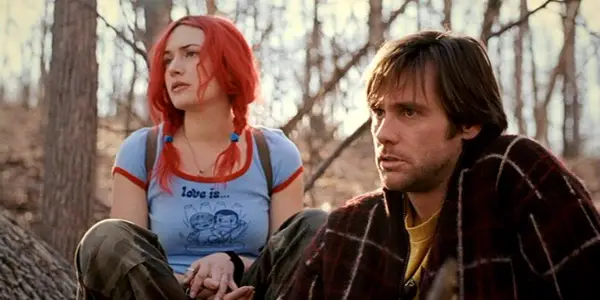
It is a startlingly serious performance from Jim Carrey, a performance that carries the film through its quiet rage and humble, desperate observations of memory – the film’s habit of dropping into surrealism gives Carrey brief opportunities to bring his most eccentric self to the performance, but on the whole this is an evolution of his work in The Truman Show, a performance stripped-back, a generous giving of self that astounds throughout.
A Graduation
As extraordinary as Carrey is in Eternal Sunshine of the Spotless Mind, and however much I could personally write about that performance in that particular film, I choose to end this piece with the ending of The Truman Show. A voice from the heavens implores Truman to reject the open door in front of him, to stay in the uncomplicated, safe world that has been built up all around him. It is a truly terrifying choice that faces Truman – he has travelled across the sea, conquered his fears, left behind the actors and props that made up his life, only to be faced with the horrifying prospect of starting his whole life anew, to willingly enter a world which he cannot imagine nor understand.
Christof, the voice from the heavens and Truman’s self-titled ‘creator’, is only able to try and tempt Truman through promises of celebrity;
“Say something goddammit, you’re live to the whole world! You’re on television!”
It demonstrates a total misunderstanding of the human spirit and of Truman himself, a callous reminder that Christof, despite having watched Truman his entire life, has not shown willingness, nor appreciation, of Truman as a real person or as an individual. The performative delivery of his classic ‘good-morning’ line, his leaned-back smile and his wonderful, curtain-closing bow, signifies the flick-of-the-switch moment for Truman: he has been an actor his entire life, unwillingly and unknowingly so, and in the final moments, presented with an audience, he takes full advantage. Carrey’s expressive demeanour, his smile, lifts his character out of the abyss and into freedom, suddenly a player in the game and not simply a pawn on the table.
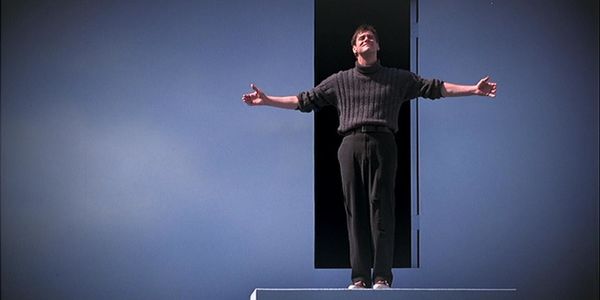
Perhaps, as he walks through that door, Truman is left behind and Carrey is reborn – the final scene is a graduation ceremony, and both the character of Truman Burbank and the actor Jim Carrey, fully deserve the applause.
What are your thoughts on The Truman Show?
Does content like this matter to you?
Become a Member and support film journalism. Unlock access to all of Film Inquiry`s great articles. Join a community of like-minded readers who are passionate about cinema - get access to our private members Network, give back to independent filmmakers, and more.
Jack is a recent MA Graduate from the film department at the University of Southampton. He has been writing about film and football casually since 2013, considering himself as an expert on the works of Akira Kurosawa, Park Chan-wook and Steve McQueen ; less of an expert on every other important director.













